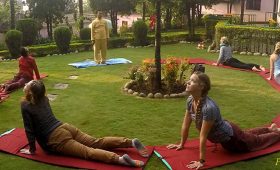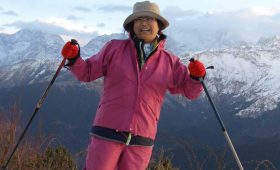Are you planning a trip to Nepal?
We have compiled some useful information that helps to keep your journey smooth and free from hassle. We believe our article on ‘Things to know before travelling to Nepal’ will be useful to the prospective travellers to Nepal.
1. Greeting
“Namaste” is the most usual form of greeting in Nepal. It is performed by joining both palms raised horizontal to your chest.
2. Visa for Nepal

Like other countries, Nepal also needs a Visa to enter and it is available to contact in the Nepalese Mission abroad or entry points in Nepal. You can get on arrival Visa at Kathmandu’s Tribhuvan International Airport (TIA). It costs $25 for 15 days, $40 for 30 days and $100 for 90 days. You will need two passport size photo and a completed form to get Visa at the airport. However, there are some exceptional countries that their citizens require to get Nepalese Visa before coming to Nepal.
3. Weather
Nepal has very typical monsoon and varied Weather. Autumn (September to November) and spring (March to May) are the best times to come to Nepal for a longer and high altitude treks. The best climbing season is from March to May. There are some important and colorful festivals to enjoy during October-November. In December and January, the climate and visibility are still good but it can get very cold at high altitude. February to April, it is an ideal time for a trek and rhododendrons (the national flower of Nepal) and other flowers are in Technicolor bloom. May and early June are hot and dusty. Mid-June to September are good time to trek in Mustang and Dolpo being the rain shadow area.
It doesn’t rain all day but it usually rains every day in summer. Most rivers are too high to raft and visiting Tibet might be a good idea in the latter part of the monsoon (August and September). Because of the varied weather conditions of Nepal, it is never closed as a whole. Short trekking trips and inbound tours are available and possible throughout the year.
4. Water
Avoid using direct running tape water. It is advised to use bottled or boiled water. The bathroom water at your hotel is not drinkable. It is only for washing purpose. It is wiser to use bottled water for brushing teeth too.
5. Currency and Notes

Nepali Rupee (Rs) is the official currency in Nepal. It is available in different denominations like 1, 2, 5, 10, 20, 25, 50, 100, 250, 500 and 1000 Rupees. The biggest is Rs 1000. All notes are of different sizes, color and in increasing order. There are several numbers of money exchange centers, banks and their ATM’s in the cities. Most international currencies and credit cards are accepted here. Credit card payments are surcharged from 4-4.5%.
6. Flight Schedules
The flight schedules to the mountain sectors like Lukla, Pokhara, Jomsom, Dolpo are very much weather permitting. It is wiser to keep some spare days to keep your journey trouble less.
7. Roads and Transportation
Kathmandu has a busy and one way traffics in some roads and streets. Some streets are under maintenance and repair. It is wiser to use Taxi or ‘Private Car with a Guide’ for an easy travel. Private Vehicles and Guides are offered by Travel Companies and Tour Operators. The Taxi Meter is set to be double from 8PM to 6AM and it is commonly accepted. Deluxe Tourist buses are available between Kathmandu and Pokhara everyday at 7AM.

8. Electricity
There may be some power cuts for a short time in Nepal. Most reputed hotels have generator backups. But it is wiser to have a flashlight and spare batteries. It is also good to bring a universal plug and voltage adapter kit for your Electronics. Nepal uses 220V.
9. Entrance Fees and Permits

Nepal’s World Heritage Sites, Temples, Monasteries, Public areas and National Parks apply entrance fees and payable in Nepalese Rupees. The fee is different to SAARC and non-SAARC countries ranging from Rs 50 to Rs 3000 (13% VAT extra). Please check with Travel Companies for recent updates.
10. Customs
Do not offer food from the same plate that you are eating and water from the same bottle you have already drunk some as it is considered rude in Nepal. Nepalese people do not touch the water bottle with their lips. It’s interesting to see how they drink it without spilling a single drop of water.
11. Clothing
There is no special dressing code in Nepal. However, long sleeve cloths are recommended. Depending on your choice of trips and weather, request for a list of equipment from Trekking Agencies. If you are trekking, you will need some quality gears including boots, sandals, sleeping bag, down jacket, sun cream, sunglasses, sun hat, scarves, lip guards, anti dust masks etc. Alternatively, you can rent sleeping bag and down jacket in Kathmandu and Pokhara also.
12. Do not trek alone
There are cases of disappearing solo trekkers in different trekking regions of Nepal. We strongly advise not to trek alone and hire a guide or a porter. Use registered Trekking Companies to hire guide and porters. Always stay in touch with families where possible. Do not forget to register with your embassy before setting for remote treks. It is also a good idea to check online forums where travellers are looking for fellow trekkers.

13. Tipping
Tipping is generally expected in Nepal and part of everyday life. However, there are no restrictions to tip more and note that tipping is always for better service. Hotels and Restaurants add 13% VAT and 10% Service Charge on their tariff.
14. Begging and Charity
Do not encourage beggars on the street by giving them money. Do not buy baby milk (pack) also for women carrying children with them. But if you are really keen to help them, get suggestions on charity trips and organizations working in Nepal. Many Travel Companies also do have their CSR (Corporate Social Responsibility) initiatives and connections to such organizations.
15. Eco-trip
Finally, help us to keep plastic free environment. Likewise, Nepal Government has banned plastic bags to carry around. Annapurna area doesn’t offer bottled water, rather there are safe water stations available established by ACAP (Annapurna Conservation Area Project). You can also ask for boiled water at the guest houses instead. Therefore, always use Responsible and Eco-Friendly Travel Companies only.




